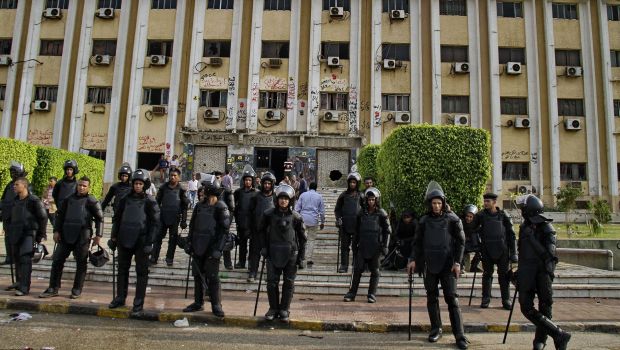
Egyptian security forces stand guard in front of the Al-Azhar Islamic university in Cairo, Egypt, Wednesday, October 30, 2013. (AP Photo/Ahmed Abd El Latef, El Shorouk)
Cairo, Asharq Al-Awsat—Eyewitnesses at Al-Azhar University said students affiliated to the Muslim Brotherhood raised the Al-Qaeda flag inside one of the university’s campuses during protests on Saturday.
As the first day of the second semester of the academic year began, students reportedly set off fireworks and clashed with security officers and other students at the Al-Azhar University’s Nasr City campus, raising the trademark black flag associated with Al-Qaeda and its affiliates on campus premises.
Speaking to Asharq Al-Awsat on condition of anonymity, an Al-Azhar University administration official said: “Students raised the Al-Qaeda flags during protests . . . [the university’s administration] identified them through CCTV cameras and they have been referred to the disciplinary committee.”
The source added: “Al-Azhar University has increased the number of administrative security officers inside the university campus, and has installed barriers around the administrative building in case of student demonstrations.”
During the first semester, clashes between Al-Azhar students protesting the ouster of former Islamist president Mohamed Mursi and security forces raged. Four students were killed, according to Egypt’s Forensic Authority, and scores injured.
This prompted the head of the university—the highest Islamic authority in Egypt and one of the world’s oldest higher-learning institutions—to officially ask security forces to come on campus to restore calm. It was the first time Interior Ministry forces had entered a university since they were banned from campuses in 2010.
A total of 21 students were sentenced to three years in jail in February for taking part in the protests and contravening the country’s new protest laws, which only allow demonstrations pre-approved by the authorities.
The source at the university’s administration also added: “[On Saturday] 275 students were referred to the disciplinary panel for causing disruption and were currently being interrogated, in addition to 500 students who were involved in violence at university residences during the first term, who were banned indefinitely from the university residences.” The source said the ban was preceded by a number of warnings to stop students participating in violent acts.
Speaking on condition of anonymity, sources at the Higher Education Ministry said that CCTV cameras would now be installed inside university departments “to monitor the movement of Brotherhood students planning to cause damage, as was the case during the first semester.”
Egypt’s military-backed interim government has cracked down heavily on the Muslim Brotherhood since Mursi’s ouster last July, blaming it for a number of attacks on police and security buildings and personnel throughout the country.
The Brotherhood was declared a terrorist organization in December following a spate of bombings, which the interim government blamed on the Islamist group. Several top Brotherhood figures have been arrested since July and are now standing trial for a number of offences.
On Sunday, Cairo’s Criminal Court adjourned the trial of Muslim Brotherhood Supreme Guide Mohammed Badie and his deputy Khairat El-Shater, along with 15 other leading Brotherhood figures, until March 29.
They are accused of inciting murder during the June 30 protests which led to the ousting of Mursi, possessing unlicensed firearms and live ammunition and joining an armed group with the aim to cause “terror, incitement, bullying and violence,” among other charges.
Meanwhile, nine explosives planted at an electricity generator in the Emraniyah district in Giza have been disabled, according to a security source, who added that a number of suspects thought to be connected to the incident had also been arrested.
According to the source, four small gas canisters with wires, a circuit board and a detonator were primed to explode on Sunday morning. Another five similar devices were found a few hours later.
